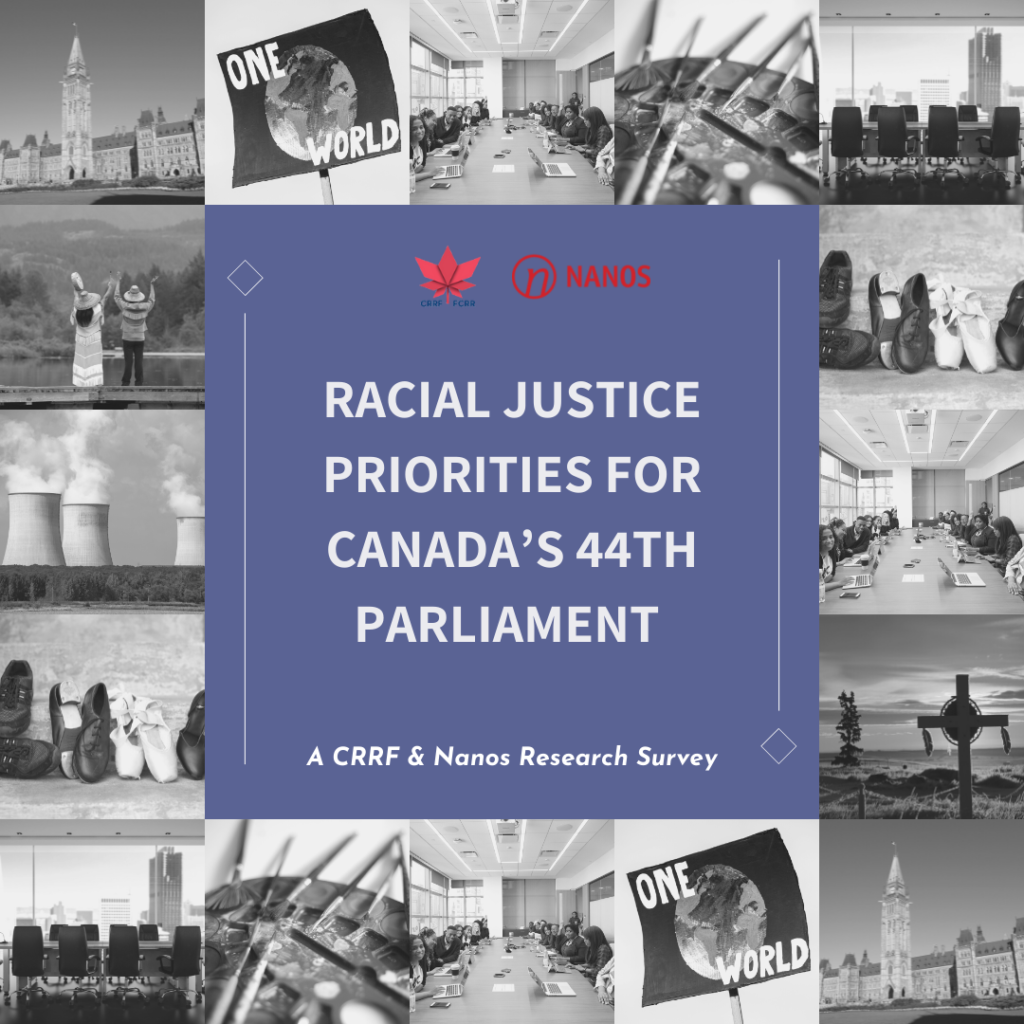- Research & Reports
Racial Justice Priorities for Canada’s 44th Parliament

Canadians express strong support for concrete action to fight racism through policy reforms and legislation for Canada’s 44th Parliament
TORONTO, November 30, 2021 – A new national survey from the Canadian Race Relations Foundation (CRRF) and conducted by Nanos Research suggests that Canadians see discrimination as a problem and want immediate concrete action on the legislative and policy front to fight racism and promote equity.
The top four racial justice priorities for Canadians include criminal justice reform, tackling online hate, strengthening employment equity, and completing the 94 calls to action from the Truth and Reconciliation Commission.
Fighting Hatred: Given the rise in Islamophobia, antisemitism, and anti-Asian racism, there is broad agreement among Canadians, whether they identify as a member of a racialized community or they identify as white, that there needs to be change, especially when it comes to fighting and addressing hate. Close to four in five Canadians (79 percent) support introducing legislation to combat serious forms of harmful online content and about three in four Canadians (76 percent) support making social media platforms legally responsible for the removal of hateful and extremist content before it can do harm.
- More than three in four Canadians (76 percent) support making social media platforms legally responsible for the removal of hateful and extremist content before it can do harm.
- Three in four Canadians (75 percent) support strengthening the Canada Human Rights Act and the Criminal Code to more effectively combat online hate.
- Almost three in five Canadians (58 percent), regardless of their age, race or region say online hatred is a major problem.
Upholding Employment Equity: Just under two-thirds (62 percent) agree that managers and executives should have employment equity, diversity, and inclusion goals in their performance management reviews to hold leadership accountable for progress in these goals.
“Canadians know that better workplaces, can have a large impact towards creating equity and inclusion across society, and want real accountability,” said Mohammed Hashim, Executive Director of the CRRF. “Employment Equity is an important tool towards creating a more equal Canada, and Canadians agree we need to modernize and improve it.”
- Almost two-thirds of Canadians (62 percent) believe managers and executives should be held accountable for employment equity, diversity, and inclusion goals
- Six in ten (59 percent) say the Canadian Human Rights Commission’s accountability mechanism should be strengthened to measure work and progress on employment equity, and diversity and inclusion.
Action on Reconciliation: In addition, Canadians also support putting in place new programs and initiatives to accelerate the implementation of the 94 calls to action, including two-thirds of Canadians (66 percent) who support appointing a special federal prosecutor to pursue those who inflicted great harm on Indigenous children in Canada’s residential school system.
- Over four in five Canadians (85 percent) want safe drinking water for First Nations, Inuit, and Métis (FNIM) communities
- Two-thirds (66 percent) say it is important to ensure that FNIM peoples are full and equal partners in Canada’s efforts to confront the climate crisis.
“It is important to note that support for action is among racialized and non-racialized Canadians but that the intensity of support among racialized Canadians on key initiatives like police oversight is even stronger,” said Nik Nanos from Nanos Research.
Other key findings from the national survey include:
- Nearly six in ten Canadians support the creation of an independent civilian oversight body of the RCMP (58 percent) and the development of a Black Canadians Justice Strategy to address anti-Black racism and discrimination in the criminal justice system (55 percent).
- Close to half of Canadians (48 percent) agree that arts/cultural institutions could do a better job at creating experiences that are welcoming to a diversity of Canadians, especially those that self-identify as part of racialized communities (57 percent).
- Over one in two Canadians agree (54 percent) that pollution, environmental hazards, and loss of biodiversity disproportionally affect racialized and FNIM communities.
Nanos conducted an online representative survey of 2,018 Canadians, aged 18 and over between November 3rd and 8th, 2021. The results were statistically checked and weighted by age and gender using the latest Census information and the sample is geographically stratified to be representative of Canada. The research was commissioned by the Canadian Race Relations Foundation and was conducted by Nanos Research.
For media inquiries please contact:
Kimberly Bennett, Director of Communications (She/Her)
Canadian Race Relations Foundation
Ph: 437 533 1104
Email: kbennett@crrf-fcrr.ca
